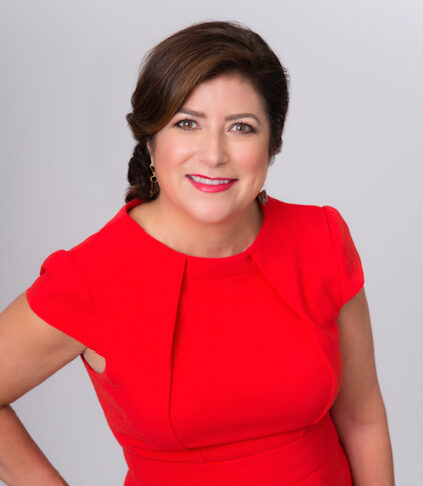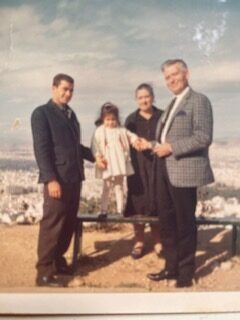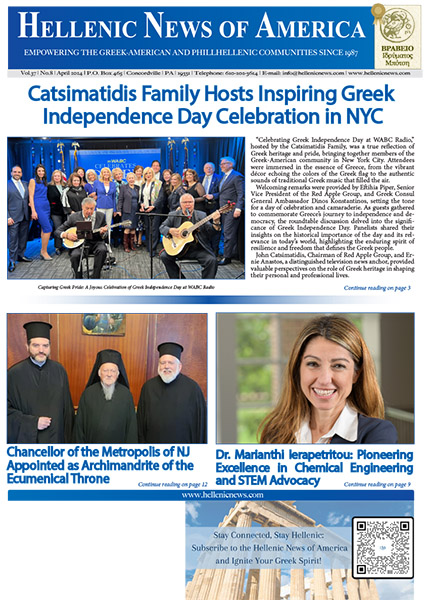Special to the Hellenic News of America
The CDC confirmed its first case of 2019 novel coronavirus in the U.S. on Jan. 21, 2020, when a Washington state resident was diagnosed after returning from Wuhan, China.
Slightly a year later, the United States has 27,137,256 coronavirus cases and 461,360 deaths.
In that time, the virus has altered our lives and the very fabric of our society.
Battling COVID-19 on the frontlines have been the medical personnel attached to health networks around the country, places like Hackensack Meridian Health, the largest health network in New Jersey.
Dorie Klissas, chief marketing officer at Hackensack Meridian Health, offers some insight into what the year’s been like and how their network is handling the ongoing pandemic.
HMH runs 17 hospitals and was among the hardest hit in New Jersey. Its academic flagship, Hackensack University Medical Center (HUMC), treated more COVID-19 patients than any hospital in New Jersey.
She had just started at Hackensack Meridian Health on Feb. 10, 2020, a few weeks before the first New Jersey coronavirus case.
“When the crisis first hit and we were working virtually, it was quite difficult to focus knowing that people were dying in the hospital,” Klissas said. “Every command center call focused on caring for patients who were in dire situations. Things were uncertain and frightening.”
She made it through by focusing day by day. Over time, she was able to move from panic and inaction to a rhythm of working despite the uncertainty.

Welcome to the new normal.
“As time went by I realized how resilient the human spirit is,” she said.
Hackensack Meridian Health set up a Network Command Center on March 2, manned by clinical experts, infectious disease doctors, and supply chain, communications, and Human Resource leaders.
On March 4, the HUMC confirmed the first coronavirus case for New Jersey.
Klissas served as chief marketing officer, working with her team to oversee all internal and external marketing and communications. She and her team played a vital role, communicating to front-line workers about the use of personal protective equipment and the redeploying of staff to care for COVID-19 patients.
“In one instance, HMH facilities converted the cafeteria at HUMC into a 74-bed COVID unit in just a few days,” Klissas said.
CDC guidelines were changing quickly as new information came in. Messages were quickly dispatched to physicians, board members, and the community through daily emails and a dedicated website.
Hackensack Meridian Health, through its Center for Discovery and Innovation, created the first COVID-19 test available in the state outside the New Jersey state lab.
“This test was up and running just one week after we treated our first patient. This added 60 tests a day when only one state lab was operational,” she said.
They conducted clinical trials on a promising convalescent plasma therapy treatment using donors with a high concentration of antibodies. At the height of the pandemic, the network was able to treat many COVID-19 patients with the therapy.
In fact, the work caught the attention of CBS’ “60 Minutes” which did a story on the treatment.
In addition, HMH was subsequently awarded a $5.5 million grant by the department of defense to continue Convalescent Plasma Work for COVID-19
HMH worked with the media to teach about proning, placing patients on their bellies to delay the need for ventilators, and about numerous clinical trials underway, including one on Reddesivir.
Hackensack Meridian Health was in the middle of a marketing campaign when the pandemic started, “Keep Getting Better.” Klissas suddenly found herself pivoting toward educating the public about COVID-19 with a “Knowledge is Power” digital campaign.
They also launched a social media campaign celebrating and thanking their health care workers called “Light the Fight”.
Marketing had to shift to a different doctor-patient environment, from in-person to promoting telehealth.
The public service message these days from HMH is about the COVID-19 vaccine.
“It is important that individually, and as a community, that we take responsibility for getting vaccinated,” Klissas said.
COVID Impact
For Hackensack Meridian Health, COVID-19 led to faster innovation.
“Traditionally, healthcare decisions may take time and layers of approval, especially since patients are involved,” she said.
But COVID required quick decisions with people’s lives in the balance.
They doubled ICU capacity network-wide within days.
Now they’re working on an array of transformational initiatives like creating a central call center to help patients better navigate the health system.
“We now know we can work at the ‘speed of light’ to better serve patients.”
For Klissas, the pandemic has reinforced how important it is to do your best work during a challenging situation.
The former news producer and nationally ranked tennis player knows about working in crisis situations, when fight or flight instincts kick in.
“What I learned was “fighting” was always the better way to go. Those skills of focus and determination have served me well during my entire career.”
From Television to Healthcare
Klissas was a producer at NBC’s “Today Show” for 15 years. A planner and an organizer, she always felt some anxiety having to drop everything and cover a breaking news story.
After a long-time medical producer at the Today Show retired, she pitched the idea of doing a medical series.
She launched with a five-part series revolving around the spinal cord injury of the late actor and activist Christopher Reeve. It was the first of many she would produce.
She next followed Katie Couric to CBS Evening News, becoming the Chief Medical Producer there.
She was fascinated by medical research and decided she’d enjoy working in an academic medical center setting. Klissas went to work at NYU Langone Medical Center, Montefiore Medical Center, Mount Sinai Health System, and now Hackensack Meridian Health.

From tennis to Harvard
Klissas grew up in a house next to one of the first hotels in Southampton on Long Island’s East End, owned by her grandparents.
When she was nine, her grandfather built tennis courts as a way to entice guests.
“I started playing with the guests and soon fell in love with the game, begging my family for tennis lessons.”
She became a ranked junior tennis player, achieving No. 9 in the Eastern Tennis Association and No. 101 in the nation. That got her into Harvard University where she was recruited to play tennis.
She studied European History with a minor in Ancient History.
Klissas took a summer internship with the Greek Embassy Press Office in Washington, D.C. and as an intern for tennis commentator Bud Collins during the U.S. Open Tennis Championships in Flushing Meadows, New York.
She used a Rotary Foundation Scholarship to study at the Graduate School of International Affairs in Geneva, Switzerland. For a while, it looked like she’d work in Foreign Service, but she found herself drawn to television instead.

Family life
Between her grandparents’ hotel and her father’s Holiday Grill Diner in Southampton, she learned as a child that the “customer is always right.”
Her grandfather was born in Chios, Greece, and became a Greek merchant marine, jumping ship in New York City before World War II to make money in America as a house painter.
He married Klissas’ grandmother, whose family had immigrated to America from Chios.
Her mother, Mary, met her father, Emmanuel, at a Greek dance on Long Island. Emmanuel was from Piraeus, Greece, and worked with his brother in the diner business on Long Island.
Klissas went to Greek school and church, and had a traditional Greek upbringing, including Greek records that her grandparents would play, but she also credits her grandparents’ hotel guests with having an influence on her.
“Some were actors, some were Indian Chiefs (the Shinnecock Indian Reservation was right near us) and others were circus entertainers. I remember meeting a man with his circus bear – and the bear stood on his feet to greet me. “
She still has family in Chios, Athens, and Piraeus and makes regular trips to see them.
“I realized I was part of a larger family with wonderful values and traditions — and we kept those traditions alive in America,” she said.
Her foundation and her spirit come from Hellenism, a defining aspect of her life.
She appreciates Greece’s golden years when Pericles ruled and great literature, philosophy, drama, and art were produced.
Her proudest moment highlighting her Greek culture came when she produced two broadcasts from the Acropolis—one during Matt Lauer’s “Where in the World Is Matt” tours and another with Katie Couric during the 2004 Summer Olympics in Athens, Greece.
Her career advice to others?
Develop niches—“so that wherever you are, you have a ‘specialty’ or ‘focus’ that can make you unique.
Each path in her varied career was helped by a specialty—knowing how to speak French, having medical knowledge, understanding media relations.
“Use your curiosity to find areas of interest and then build up your knowledge so you are an expert in that area,” she said. “Look at me; I have many areas of expertise from sports to news to medical news and now marketing and public relations. What’s next?”






